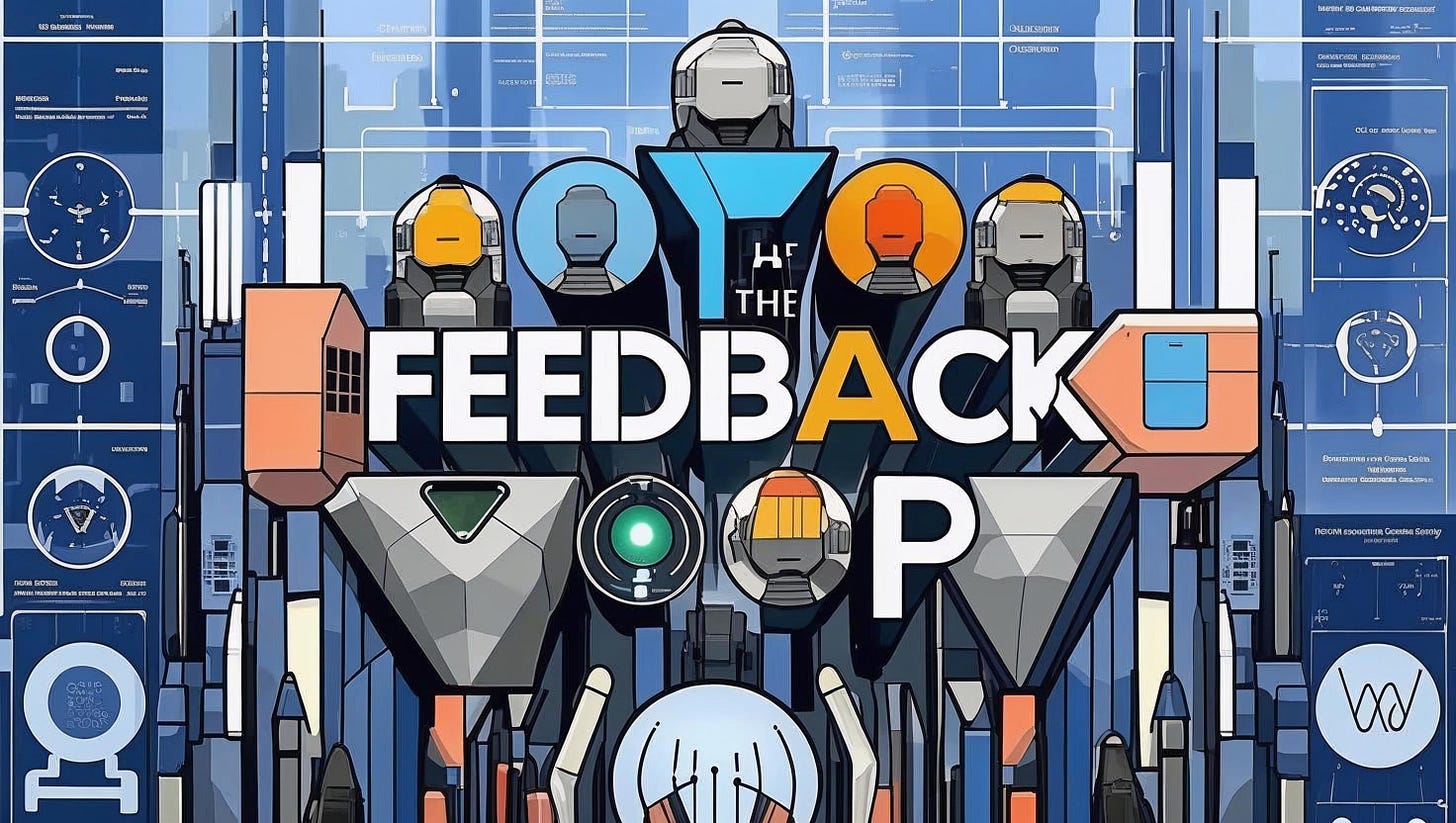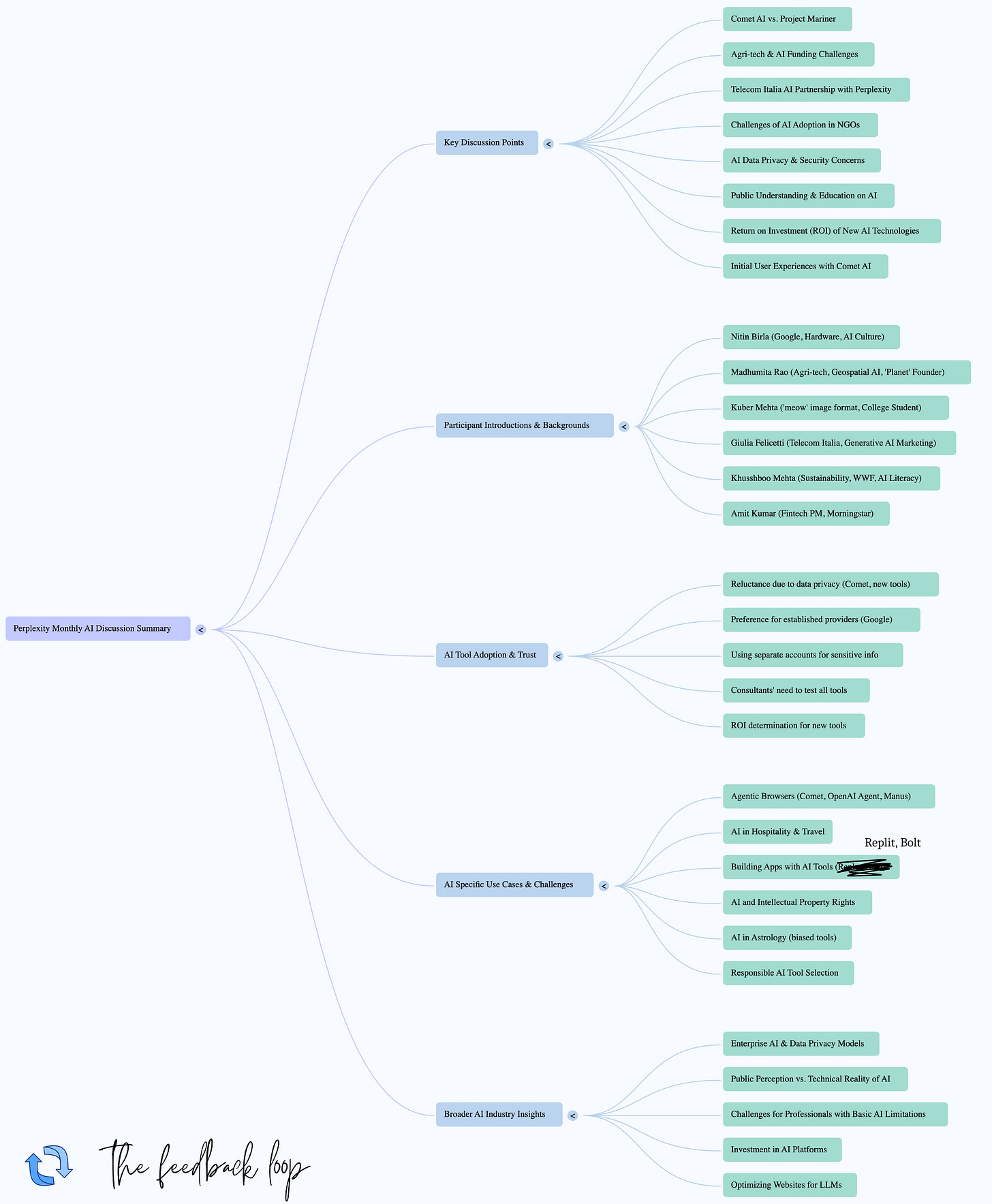The "Perplexity Monthly Catch Up" meeting On July 25, 2025 involved participants like Poonam Parihar, Adarsh S Lathika, Nitin Birla, Madhumita Rao, Kuber Mehta, c pandya, Giulia Felicetti, Khusshboo Mehta, Rohit Khanna, and Amit Kumar in a broad discussion on AI. The conversation covered individual introductions and professional backgrounds, experiences with various AI tools, particularly Comet, and challenges such as AI adoption in NGOs, data privacy, public understanding of AI, and the ROI of new AI technologies. Key highlights included Nitin Birla's comparison of Comet to Google's Project Mariner, Madhumita Rao's agri-tech venture, and Giulia Felicetti's insights into Telecom Italia's partnership with Perplexity AI. Participants also shared reservations about Comet related to data privacy.
Key takeaways
Diverse AI Tool Capabilities and Limitations: Participants gained specific insights into the technical performance and limitations of various AI tools. Manus AI was highly effective for complex tasks such as generating detailed travel itineraries and rendering 3D objects using 3JS, where other AI models often failed. In contrast, OpenAI's agent was found disappointing for creating presentations, struggling with content accuracy, typography, and often producing inferior results despite significant processing time. Comet, described as an "agentic browser" comparable to Google's Project Mariner, enables "agentic tasks" and can observe and replicate user actions to create repeatable tasks, such as cleaning spam folders, though it requires the computer to be active and running.
Fundamental Data Privacy and Security Architecture in AI: A critical technical learning revolved around how AI models process data and the inherent privacy risks. It was clarified that AI models for tools like Comet do not run on the user's device but on the company's (e.g., Perplexity's) servers, meaning user data is transmitted to them. Despite claims of anonymization, participants expressed significant concerns about data privacy, citing that this anonymization depends entirely on trusting the company, drawing parallels to data practices of large tech companies like Meta and Microsoft. It was also highlighted that true data privacy with AI often requires running open-source models on private hardware, due to common data collection policies in commercial and enterprise software, though this comes with higher cost barriers and potential performance limitations compared to well-funded commercial options.
AI and Intellectual Property (IP) Ownership: A key technical-legal learning emphasized that users typically do not own the copyright to AI-generated content unless they hold an enterprise license. The content generated often remains the property of the AI companies, and user data, including prompts and file uploads, is frequently used to train AI models (unless explicitly stated otherwise for enterprise versions). This evolving legal landscape highlights the technical reality of how AI systems learn and produce output.
AI's Role in Enabling Non-Technical Development: Participants learned that modern AI tools are making development more accessible. Tools like Bolt, Replit, or Curser can enable non-developers to build applications and even WordPress websites without needing coding expertise. However, the quality of these AI-generated applications depends on their complexity.
Specific AI Application Challenges in Industry: It was noted that AI agents and tools, particularly those like ChatGPT's agent demo, frequently focus on hospitality use cases such as booking hotels or wedding venues. This implies a technical inclination or ease of application in certain domains, possibly due to structured data or common query types.
AI's Limitation in Design and Visual Generation: A specific technical frustration was highlighted regarding AI's ability to handle design and visual elements. Tools struggled with accurate image generation, typography, and precise alignment for visual outputs like Gantt charts or infographics, indicating a current technical limitation in AI's understanding of visual aesthetics and layout compared to text-based generation. Kuber Mehta specifically mentioned AI "sucks at" rendering 3D objects using 3JS due to insufficient good training data.
Mind Map Overview of the Discussion.
Full Summary
Here's a summary of the "Perplexity Monthly Catch Up" meeting in bullet points, covering key points discussed by the participants:
Participants: Poonam Parihar, Adarsh S Lathika, Nitin Birla, Madhumita Rao, Kuber Mehta, c pandya, Giulia Felicetti, Khusshboo Mehta, Rohit Khanna, and Amit Kumar engaged in the discussion.
General Topics: The meeting covered individual introductions and professional backgrounds, experiences with various AI tools (particularly Comet), and challenges related to AI adoption, data privacy, public understanding of AI, and the ROI of new AI technologies.
New Individual Highlights & Backgrounds:
Nitin Birla (Google, San Francisco Bay Area): Leads hardware teams on the business side, with 15-20 years in consumer electronics hardware (previously Amazon, Sony). He is involved in spreading AI culture within his company and was curious about Comet's agentic browser capabilities compared to Google's Project Mariner (a Chrome extension for agentic tasks) and OpenAI's agent mode. He theoretically described Comet as "Project Mariner on steroids".
Madhumita Rao (Swindon, UK): A product person with over 25 years in geospatial earth observation, including physical mapmaking and geocoding features. She founded "Planet," an agri-tech platform using real-time satellite data and AI, and has extensive AI experience dating back before the term was coined, including fuzzy logic and current work in predictive analytics for crops using machine learning and computer vision. She discussed challenges in securing funding for her startup and plans for pilot programs in India. She moved to the UK in 2015 via an "exceptional talent visa".
Kuber Mehta: Early in his career, having just finished his first year of college. He has already developed innovations such as a new image file format called "meow" for AI image reading.
Giulia Felicetti (Italy): Works in the marketing department for innovative services at Telecom Italia, focusing on generative AI. She discussed Telecom Italia's successful partnership with Perplexity AI, chosen for its simplicity and ease of explanation to general customers, noting a "crazy" successful launch and high user appreciation. She also expressed concerns about Comet related to data privacy.
Khusshboo Mehta (Dubai, vacationing in Delhi): Transitioned from a German teacher to sustainability and strategic partnerships, currently working with WWF. She highlighted challenges of AI adoption in NGOs due to limited resources and budget. She is actively learning about AI literacy, prompt engineering, and custom GPTs, aiming for a career in AI because it doesn't always require coding or machine learning.
Amit Kumar: A product manager in a fintech firm. He shared initial reservations about Comet related to sharing credentials due to the extensive personal data in platforms like Gmail, despite appreciating its UI/UX, particularly the astrological elements. He advised against taking AI astrology tools seriously for life decisions.
Adarsh S Lathika: Expressed greater trust in Google with personal data due to a long-standing relationship and uses separate phones/accounts for sensitive information to maintain privacy. He is reluctant to adopt new AI tools like Comet due to already using and mastering several others (Gamma, Make, Relevance AI, Replet) and prefers to wait for Google's upcoming AI tools, having received a sneak preview of their advanced features. He emphasized that while AI is useful for preparing documents, real business deals still require human interaction.
c pandya: A consultant who tests all available AI tools due to his profession and passion for AI. He manages privacy by using Comet only for publicly available information, avoiding sensitive banking or email activities. He agreed that determining the ROI of new AI tools is crucial and often possible within the first half-hour of exploration. He found non-traditional use cases for Comet, such as having it observe and record actions on a browser to create repeatable tasks (e.g., cleaning a spam folder).
Rohit Khanna: Expressed concern that even professionals do not fully understand AI, and the general population lacks basic AI understanding. He is building a platform to demystify AI for the travel and hospitality industry. He noted the industry's slow adoption of technology as a significant challenge.
Discussions on AI Tools & Concepts:
Comet: Described as an agentic browser, compared to Google's Project Mariner and OpenAI's agent mode. Users expressed reservations about data privacy. Its UI/UX was appreciated, especially astrological elements. It can record and repeat actions, but requires the computer to be active and running for tasks, a safety feature. The AI model runs on Perplexity's servers, raising privacy concerns despite claims of anonymization.
Google's Project Mariner: A Chrome extension for agentic tasks, seen as similar to Comet.
OpenAI Agent: Described as a workflow builder within ChatGPT's interface, using a small web version for its AI. One user had a disappointing experience using it to create a presentation, noting it took an hour and the output was inferior to what could be produced with other tools like Gamma, with issues like disappearing content and poor typography.
Manus AI: Another agentic tool that generated a detailed 5-day Thailand itinerary, including flights, hotels, and activities, in 20 minutes. It was also found to be better at handling complex tasks like rendering 3D objects using 3JS compared to other AI models.
Other AI Tools: Gamma, Make, Relevance AI, Replit, Bolt, and Cursor were mentioned as tools used or capable of building apps and websites. "Passion.io" was also mentioned as an AI-based app creation tool requiring upfront payment.
AI and Intellectual Property Rights: Discussion covered that users typically do not own the copyright to AI-generated content unless they have an enterprise license. Legal rulings in the US suggest content significantly generated by AI is not user-owned. Terms and conditions of AI services often require users to indemnify companies for malicious content, while the generated content is owned by the companies, and user data is often used for training models.
Challenges and Concerns Related to AI:
AI Adoption in NGOs: Limited resources and budget hinder the adoption of new technologies like AI in non-profit organizations.
Data Privacy and Security: Major concerns were raised regarding AI tools like Comet. Enterprise versions, such as Copilot, offering dedicated servers, do not guarantee data privacy, only performance. True data privacy with AI often requires running open-source models on private hardware due to common data collection policies in enterprise software. The cost of developing private AI solutions is a significant barrier compared to commercial options. There is a general lack of concern among the public about security and privacy with AI devices like Alexa.
Public Understanding of AI: Many professionals and the general population do not fully grasp AI concepts, such as anonymous usage or the drawbacks of uploading pictures. Many people equate AI solely with GPT and believe they are AI experts if they know how to prompt GPT.
Return on Investment (ROI): The difficulty of establishing ROI for new AI tools beyond initial excitement was discussed by consultants.
Entrepreneurship and Risk-Taking: Indian culture often discourages risk-taking, favoring safer career paths, which changes later in life due to increased confidence and financial independence.
Technology Translation: A significant gap exists in the networking and telecom industries in translating technical concepts to non-technical people and connecting directly with consumers.
AI Limitations: Frustrations with basic AI issues, such as inaccurate image generation and competition among platforms to add features rather than fixing fundamental problems, were noted.
Responsible AI Tool Selection: The importance of responsibly choosing AI tools and identifying parameters for selection was highlighted as a crucial, often overlooked aspect.
Other Noteworthy Points:
The meeting began with initial greetings and pet introductions (Coco and Bella).
Poonam Parihar reflected on the fellowship's journey, noting the significant growth in AI discussions and awareness among participants over the past few months, highlighting the value of the WhatsApp group for shared knowledge.
The Perplexity Pro license for participants is valid until March or April 2026, depending on activation.
Booking.com released a global AI sentiment report, acknowledged as potentially skewed.







Share this post